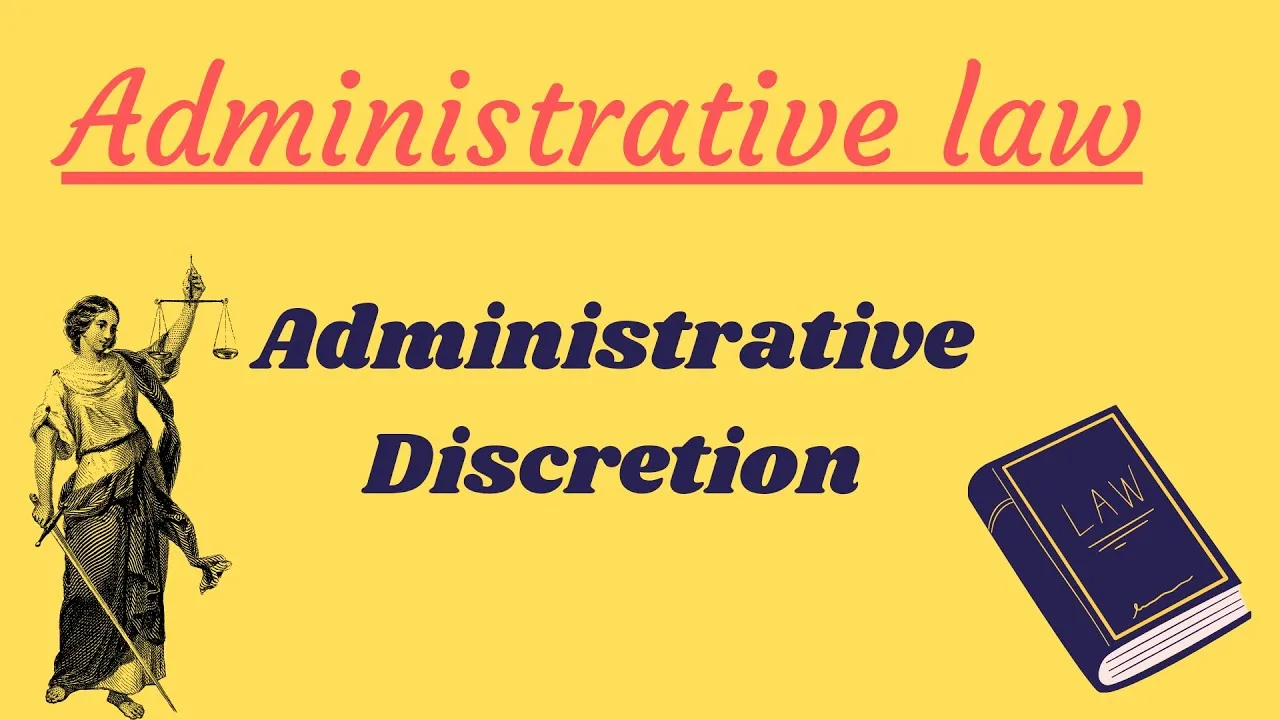These notes delve into administrative discretion, exploring its definition and the mechanisms for controlling it, including parliamentary oversight, judicial review, and procedural regulations.
What is administrative Discretion?
Administrative discretion is an informal unilateral practice and is therefore unprotected by the protections inherent in the structured procedure. Discretion in simple words means selecting among available alternatives without adhering to predetermined criteria, regardless of the choice’s nature. It’s indispensable for individualizing administrative power and addressing the dynamic nature of the modern state. However, unchecked discretion can be detrimental to liberty.
There are three main heads under which the control over administrative discretion exercised.
- Parliamentary Control over administrative discretion
- Judicial Control over administrative discretion
- Procedural and Executive Control
1. Parliamentary Control over Administrative Discretion
There are several grounds for parliamentary control:-
A. Direct General Control:
Exercised during the passage of enabling acts, involving methods like parliamentary hearings and discussions on delegation bills. However, these methods are underutilized due to tradition or lack of experience.
Details about Direct General Control In India
In India, different methods and procedures are used, such as discussions on the delegation bill, which include aspects such as requirement, scope, form of delegation and authority delegated to. In addition, any Member can.ask questions on any aspect of the delegation of legislative powers and, if disappointed, may give notice of discussion under Rule 59 of the Rules of Procedure and Conduct of Business in Lok Sabha. Budget cuts during grant voting and committee debates throughna private member’s Bill requesting changes to the parent act or through a debate at the time of the President’s speech to.the joint parliamentary session are also useful. Yet in India as well as in the UK. Those methods are seldom employed. This is due solely to a lack of tradition or experience. However, scholars think that this approach should be used widely and efficiently to nip delegation vices in the bud.
B. Direct Special Control:
Includes the “laying on the table” method, requiring administrative laws to be submitted for legislative approval. It contains three important parts to be exercised according to the degree of control required.
- Simple Laying
- Negative Laying
- Affirmative Laying
And two key tests are the “Mandatory test” & “Directory test.”
- Mandatory testing – Where laying demand is a condition pattern to direct the rule into effect, then laying need is compulsory in such a case. Where the clause that the rules should be drafted in a particular format is specified then it becomes mandatory to adopt the format.
- Directory test – If the laying prerequisite is next to enforce the rule, it will be a directory in nature.
C. Indirect Control:
Enforced by parliamentary committees scrutinizing subordinate legislation’s alignment with the act’s objectives, judicial jurisdiction, retrospective effects, adherence to principles of natural justice, and expenditure sources. The committee’s principal job is to investigate.
- Whether rules are according to the general object of the act.
- It bars the jurisdiction of the court in direct or indirect ways.
- Whether it has a retrospective effect or not.
- Whether it safeguards or destroys the Principle of Natural Justice.
- The expenditure involved in it is from Consolidated funds.
For LAW Students-
Judicial Control over Administrative Discretion
The rule of law has been applied to judicial review. The court must see that the delegated authority as defined is within the meaning of the Constitution.
Although Indian courts have established some successful guidelines for proper exercise of discretion, the conspectus of judicial conduct remains stagnant, varied, and residual, and lacks American courts’.activism. Administrative direct judicial review process is exercised in two grounds :
A. Control at the Stage of Delegation of Discretion:
Courts assess the constitutionality of laws delegating discretionary powers, ensuring alignment with fundamental rights set out in Part III of the Constitution of India. Consequently, if the law confers undefined and broad discretion on any administrative authority, it may be considered ultra vires Article 14, Article 19 and other Constitutional provisions.
B. Control at the Stage of Exercise of Discretion:
Courts scrutinize administrative actions for compliance with statutory structures and the rule of law. Various cases illustrate instances of mala fide exercise of power and abuse of discretion.
Procedural and Executive Control
Involves protocols for enforcing laws or procedures, with no clear guidelines until legislative intervention. Procedural regulation includes three components:
- Pre publication and consultation with an expert authority,
- Publication of delegated legislation.
- Laying of rules.
It can be either Mandatory or Directory, to know, certain specified parameters are given:
- Scheme of the Act.
- The intention of the Legislature.
- Language used for drafting purposes.
- Inconvenience caused to the public at large scale.
and these four parameters were given in the case Raza Buland Sugar Co. vs. Rampur Municipal Council.[3]
References:
[1] For further reading on delegated legislation: link
[2] For insights on parliamentary control: link
[3] For a case example illustrating abuse of administrative discretion: link
FAQs
What is administrative Discretion?
Administrative discretion is an informal unilateral practice and is therefore unprotected by the protections inherent in the structured procedure. Discretion in simple words means selecting among available alternatives without adhering to predetermined criteria, regardless of the choice’s nature.
main heads under which the control over administrative discretion exercised
There are three main heads under which the control over administrative discretion exercised.
- Parliamentary Control over administrative discretion
- Judicial Control over administrative discretion
- Procedural and Executive Control



